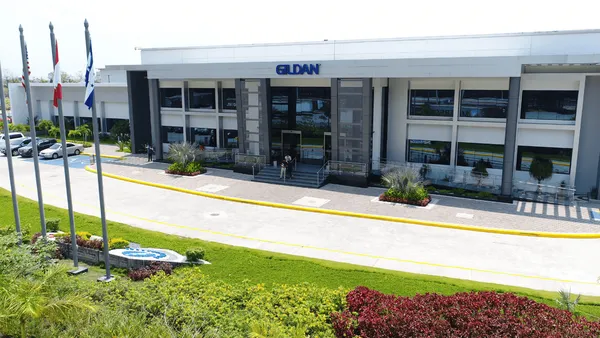UPDATE: May 27, 2020: A bankruptcy judge granted J. Crew's request for relief on its rent obligations for the 60 days following its Chapter 11 bankruptcy filing, according to an order issued Tuesday. The order had prompted numerous objections from landlords.
Dive Brief:
- Several of J. Crew's landlords are objecting to the apparel retailer's request in bankruptcy court to skip on $23 million in rent due over the first two months of its bankruptcy.
- Major mall operators, including CBL & Associates and Simon Property Group, have raised issue with J. Crew, which closed its stores in response to the COVID-19 crisis, skipping rent including on stores that reopen. So far, more than 15 objections have been lodged against J. Crew's request, which was filed earlier this month.
- Another landlord, Grand Place, argued in court papers that J. Crew's bankruptcy "should not be funded, on an interim basis, by Debtors' [i.e., J. Crew's] landlords and administered for the benefit of Debtors' secured lenders without some form of adequate protection being granted to Debtors' landlords."
Dive Insight:
These are tense times in the relationship between many landlords and retailers. While no doubt many are having productive discussions about how to share the financial burden of an unprecedented pandemic and worldwide shutdown of commerce, others have taken stark positions. And some disputes have ended up in court.
Ross and Gap have both been sued by landlords over unpaid rent amid the retail closures. Other major retailers, both healthy and struggling, have skipped rent during the closures, including Burlington Stores, Pier 1, Urban Outfitters, PVH, Modell's, and many others. Driving these moves is a fundamental need for liquidity as store revenue zeroes out.
As J. Crew attorneys argued in making the request to avoid rent obligations in the initial weeks of its bankruptcy, the retailer had made "several difficult economic decisions in an effort to preserve liquidity, including furloughing over 11,000 valued employees, reducing salaries of remaining employees, and largely reducing expenses to only those necessary to preserve the Debtors' estates and the health and safety of employees still maintaining the Debtors' operations."
In that light, paying the $23 million in rent obligations that would accrue between J. Crew's filing and early July "is not prudent or in the best interest" of J. Crew and its creditors, according to the company.
But of course landlords have their costs, financial obligations, employees and liquidity needs. Grand Place, which owns two properties rented by J. Crew, argued that J. Crew's request's puts "too much burden and risk" on landlords, who have mortgage payments to make and have to maintain properties and pay taxes and insurance, among other expenses.
Simon, which runs and/or owns 126 properties leased by J. Crew, pointed out in its objection that J. Crew's request made no distinction between properties that have or will reopen, according to local orders, and those that remain shuttered.
With retail broadly, questions about whether rent should be paid or not broadly tackle who bears the burden of the current financial crisis. Along with missing rent payments, retailers have furloughed employees, cut executive pay and stretched their vendors. In bankruptcy, it's also a question of who funds a company's reorganization efforts or liquidation.













